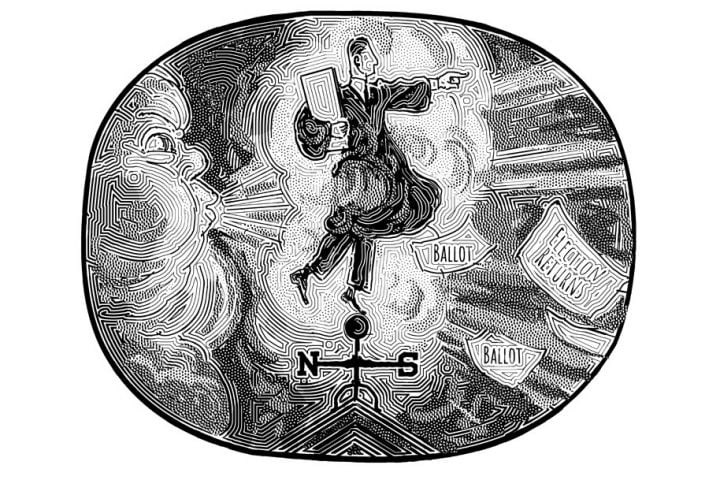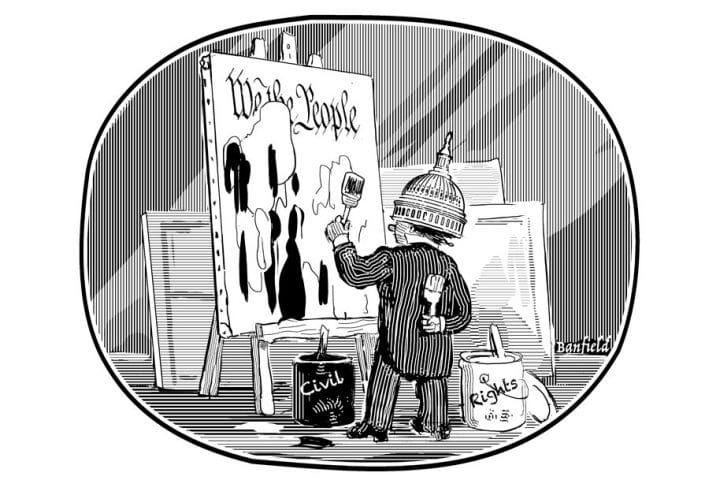Books Reviewed
From the fall of the Berlin Wall to the election of Donald Trump, American foreign policy was prisoner to the notion that the mere presence of democratic forms of government would transform the political culture of countries with no experience of popular sovereignty. The conventional wisdom during the disastrous presidency of Boris Yeltsin held that post-Communist Russia would evolve into a liberal democracy. China’s growing reliance on market mechanisms to generate growth would accomplish something similar. Majority rule in Iraq would create an Arab democracy, while the grotesquely misnamed Arab Spring would recall the American Founding. At great cost, America learned that culture does not easily change in the presence of institutional novelties.
The wrong answer at least had the virtue, as H.L. Mencken might say, of being simple and clear. The right idea—that American culture has unique characteristics that explain our country’s extraordinary success—is harder to define. Lawrence Mead wrestles with the notion of Western individualism in his new book, Burdens of Freedom. His approach is eclectic, examining the issue from several vantage points and through the medium of a number of academic disciplines. That is a virtue rather than a deficiency; if Mead doesn’t always hit his target dead on, he lays out the problem in a way useful for reflection and debate. It is a valiant contribution to a difficult subject and deserves a wide readership.
A professor of politics and policy at New York University, Mead sees the world at a great turning point, which he calls—with irony—“the end of history.” He doesn’t believe that history will bring about a liberal world order, as Francis Fukuyama imagined, but rather that the Hegelian idea of such progress is itself at an end. “[T]he end of history means, not the end of all conflict,” he explains, “but the shifting of conflict from ideological differences within the Western world to cultural differences between the West and the non-West.” Western progress will not simply spread to non-Western cultures, but will get bogged down in cultural adversity. For Mead, “cultural difference is, in fact, more important than the differences fought over during history.”
In some form, it was probably inevitable that institutions based on individualism would arise in Europe and its offshoots. Far more significant is the fact that those institutions have not traveled well to non-Western societies…. [T]he West’s “free” institutions clearly are an ill fit in most of the world.
Sadly, the norm among the world’s civilizations is not liberal democracy; it is, statistically speaking, extinction.
* * *
Mead’s understanding of western individualism is unabashedly Biblical. Although he admires the ancient Greeks, he observes that they “achieved no political structure larger than the city-state.” After Alexander the Great’s conquests, in the words of historian William H. McNeill, “most of the energy with which the Greeks had begun…had evaporated.” The Romans, writes Mead, “achieved the rule of law more fully than any previous empire. And the law came to be framed mostly in terms of individuals.” Nevertheless, “[t]he individualism of classical times…did not endure.”
What the Greeks and Romans failed to accomplish, Judaism and Christianity brought to fruition:
Rome and the church provided institutions to reconcile a fractious temperament with order. Probably of equal importance was the inner influence that the church conveyed. Both the Old and New Testament express a faith that promoted and also disciplined individualism like no other.
By contrast, “The religions of the East…lacked moral commandments.” Unlike “Islam, which became Christianity’s great rival in the East,” and which “resisted individualism,” Judaism and Christianity “both embraced freedom while at the same time calling individuals to higher purposes and moral behavior.” “More than anything else,” Mead concludes, “that faith ‘defined Europe’ and gave it ‘a transcendent goal.’”
He makes a striking assertion, too, about the definitive event in the Bible’s account of the patriarchs, Abraham’s readiness to sacrifice his son (Genesis 22). Because of Abraham’s obedience, God promises he will bless him and his descendants and make him a blessing for “all the nations of the earth.” This episode “expresses a profound insight that would be central to all of Western experience.” As Mead explains,
To internalize God’s will promotes social order, yet it is not contrary to freedom. Indeed, it is the essence of freedom. The moral principles that individualists imbibe steer them away from obvious faults, but also motivate their deepest endeavors, both for themselves and for others.
Mead’s deep theological insight into a most difficult and controversial passage in the Hebrew Bible is consistent with the mainstream rabbinic belief that freedom comes from aligning one’s individual will with God’s will. Freedom stems from human creativity, and the price of creativity is existential risk, the risk that Abraham accepted when he laid his heir and future on the altar at Mount Moriah. Mead looks for the underlying source of culture in the sacred. I agree with him, but in our civic discourse conditioned by classical political rationalism, the Biblical point of view requires a more extensive presentation.
* * *
Given the pivotal place this biblical concept of freedom has in Mead’s account, his synopsis of Abraham’s trial seems scanty in proportion to the importance he assigns it. Jewish and Christian commentators have wrestled with the Binding of Isaac for millennia, and many read it very differently. This is one of many instances in which Mead offers an arresting insight into a difficult problem with only a cursory explanation. His book attempts to take in the whole of Western history and culture. It reflects a lifetime of careful reading and consideration about the sources of culture, and its impact on society. But it sometimes touches the ground too lightly as it sweeps through a vast range of historical and social analysis.
For the most part that is not Mead’s fault. As he explains at the outset, the academy has repressed research into the subjects he wants to address: “cultural difference has been ignored in virtually all scholarship on public affairs, both foreign and domestic” (emphasis in the original), and, one might add, by the Left as well as the establishment Right. That leaves scholars like Mead to blaze many trails on their own, because the feckless academy has ignored them. He is determined to change this: “If nothing else, Trumpism demands a more candid discussion of these differences. In order for American world leadership to endure, a cultural battle to reaffirm an individualist America must be fought and won.”
A consistent theme nonetheless emerges from his tour d’horizon and leads to a powerfully argued conclusion: the Biblical Protestantism that emerged in the English-speaking world gave America an exceptional aptitude for self-government that cannot easily be conjured out of radically different cultural traditions. As he notes, “Americans too readily assume that political rights and accountable government are compatible with order…. They seldom reckon with the exceptional, individualist psychology that reconciles freedom with order.”
* * *
Capitalism in Mead’s view is not a self-regulating mechanism in which autonomous actors maximize utility, but rather a set of social relations that depend on shared culture. “The free market,” he argues, “requires some elements of moral commitment by individuals toward each other, not simply pursuing self-interest.” He cites Max Weber’s famous thesis about capitalism and the Protestant ethic. Calvinists couldn’t be sure they were among the elect predestined to be saved, and sought “to prove it through outward success, such as getting rich. Thus, spiritual insecurity drove them toward secular achievement.”
In this regard Mead is too modest. His Biblical view of the balance between order and individual initiative is perhaps more powerful than Weber’s, who saw the Calvinist predilection for capitalism as a sort of rationalization. Most great entrepreneurs have a higher purpose than adding zeros to their net worth. By the same token, the capital markets that make it possible for entrepreneurs to raise capital for big projects depend upon a fabric of trust found only in a small number of countries. In most of the world capital is hoarded and hidden from the arbitrary reach of the authorities against the eventuality of expropriation. Popular participation in financing of canals and railroads in the Anglo-Saxon countries during the early 19th century gave Britain and its offshoots an insuperable advantage, which in turn depended on trust in the rule of law and the good behavior of entrepreneurs. It is no accident that New York and London remain the epicenters of world capital markets. Even China depends to an important extent on Hong Kong and its British law.
Economic game theorists instruct us that it is in a player’s interest to be honest in a series of repeated transactions. By contrast, Mead argues:
A capitalist economy may free a society from medieval constraints such as “just price,” but that society must then develop a new, “market morality” appropriate to capitalism. Individuals must be honest, accountable for their behavior to others, and—above all—willing to deal with everyone impartially, even strangers. In the West, Protestantism strongly promoted those values. A readiness to trust relative strangers in economic and political matters is a quality that sharply distinguishes most people in Western countries from those in the non-West, where people tend to trust only their immediate family or associates.
I find this cultural case for free markets more convincing.
* * *
Mead insists that U.S. policy must be rooted in a shrewd understanding of culture. For example, a “clear implication of cultural difference is that the United States should abandon the direct promotion of democracy abroad (aka nation-building).” Although “America has been an exemplar of popular government since before its founding,” “many American leaders have seen their mission as exporting democracy to less fortunate lands…[b]ut these crusades typically took no account of the cultural preconditions of good government.” As a result, the United States “has conspicuously failed to achieve stable democracy where it has recently intervened—in far less civic Somalia, Haiti, and Bosnia, and above all in Afghanistan and Iraq. The recent Arab Spring also saw repeated defeats of democracy.”
Similarly, sound immigration policy must take account of cultural differences. Mead has no patience with the view of American elites “that any open discussion of culture is racist.” This is “a red herring” and “a way to block discussion of cultural difference.” Yet when Mead in his pessimism about America’s capacity to assimilate Hispanics writes that “[t]hey typically display the passive and tentative style characteristic of the non-West, very distant from the confident individualists who formed America,” surely he owes the reader a stronger foundation for this generalization. How well do Hispanics assimilate into American culture? After all, Hispanics are a heterogeneous population, and there is some evidence that the U.S. is acculturating many if not all Spanish-speaking immigrants. John B. Judis has recanted his thesis about a “new American majority” of blacks, Hispanics, and other minorities, noting that most third- and fourth-generation Hispanics identify simply as “whites.” In fact, 37% to 38% of Latino voters approved of President Trump in recent polls.
That is not surprising, given that illegal Hispanic immigrants compete for employment with legal immigrants. The ascendance of evangelical Protestantism—a distinctly Anglo-Saxon phenomenon—among Hispanics has a broad impact, too; more than a fifth of American Hispanics are Protestant and the proportion is growing. And there is some evidence that Hispanics are moving up into the middle class. The college graduation rate for Hispanic males six years after matriculation rose from 41% to 49% between 1996 and 2009, while the black graduation rate languished at 34%. If American high schools and universities taught traditional civics rather than resentment, one imagines assimilation would be smoother. I do not cite these data to justify more Hispanic immigration (I support an Australian-style merit-based system). The issue, rather, is that investigation of cultural differences requires closer analysis.
Mead contrasts “active” and “autonomous” Westerners with “passive and reactive” Eastern cultures. Eastern peoples, he writes, “usually follow outside direction—whether from tradition, from the society around them, or from public authorities.” The terms “individualism” and “collectivism,” though, do not quite capture the difference between Asia and the West.
* * *
In one sense the Chinese are among the most individualistic people in the world. The head of household or owner of a business or provincial official is a little emperor, owing obedience to the bigger emperor above him, but endowed with arbitrary authority over those below him. China’s petty despots have enormous latitude to assert their individuality. The Chinese are amoral familists, as Edward Banfield characterized southern Italians in The Moral Basis of a Backward Society (1958). The emperor is a sort of capo di tutti capi, whose function is to prevent all the aspiring emperors from killing each other. The emperor also presides over a rigorous if rather stylized meritocracy based on standardized exams, which allows for a degree of social mobility. Chinese society, though, is rigidly hierarchical, in sharp contrast to the antinomian Protestantism that informs the American character. It is not so much that Asian society lacks individualism, but rather that it has never found the balance between individualism and order that the West learned from the Bible.
That said, China’s mode of individualism elicited great innovations in the past. Between A.D. 800 and 1200 China invented movable type, printing, the magnetic compass, gunpowder, clocks, the chain pump, movable sails for ocean-going vessels, the belt-driven spinner, the canal lock and sluice gate, and a primitive version of the Bessemer process for steel. Why the Industrial Revolution did not begin in China under the Song Dynasties remains a topic of academic conjecture. China today wants to dominate what it calls the fourth industrial revolution.
“The chief threat to our nation today is economic competition with Asia, especially mainland China. That contest…is ultimately a contest of cultures,” Mead argues. “It is also likely, because of the West’s greater capacity for innovation and greater sense of responsibility for the world, that American and Western primacy will endure despite the advance of Asia.”
* * *
It is hard to disagree with mead’s assessment that China is the chief threat to American preeminence, but this raises a question for his conceptual framework, which draws a bright line between individualism and collectivism. Evidently some forms of collectivism are quite different from others, so much so that the Asian mode of collectivism—if that is the right characterization—is able to challenge Western individualism. The consensus view among American observers of China has been that market reforms must inevitably lead to political reforms. To Western eyes, China is the bumblebee that can’t fly, but nonetheless does. If it succeeds, we tell ourselves, it can only do so because it is a Western-style democracy in chrysalis. Narcissism is the salient characteristic of America’s evaluation of China, and it has not availed us.
Lawrence Mead’s Burdens of Freedom shows not only how impoverished U.S. policymaking has been, but how inadequate our investigations have been into the cause of these policy failures. He has made a brave and largely effective effort to place culture at the center of policy analysis. I hope his book will help us to refocus our thinking on questions we have neglected too long.






